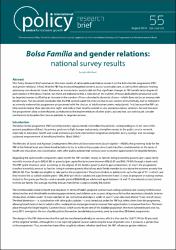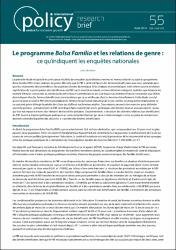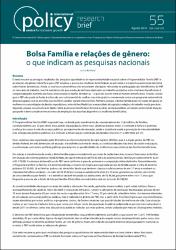Please use this identifier to cite or link to this item:
https://repositorio.ipea.gov.br/handle/11058/15166Full metadata record
| DC Field | Value | Language |
|---|---|---|
| dc.contributor.author | Bartholo, Leticia | |
| dc.date.accessioned | 2024-10-03T23:51:55Z | - |
| dc.date.available | 2024-10-03T23:51:55Z | - |
| dc.date.issued | 2016 | |
| dc.identifier.uri | https://repositorio.ipea.gov.br/handle/11058/15166 | - |
| dc.description.abstract | "This Policy Research Brief summarises the main results of nationwide quantitative research on the Bolsa Família programme (PBF) and gender relations. It finds that the PBF has increased targeted women's access to prenatal care, as well as their decision-making autonomy over domestic issues. Moreover, an econometric analysis did not find significant changes in PBF beneficiaries' degree of participation in the labour market, but there are indications that a reduction in the number of hours dedicated to productive work by targeted women is offset by an increase in the number of hours devoted to domestic chores—which does not occur among male beneficiaries. The document concludes that the PBF cannot evade the criticism that it uses women instrumentally, but to interpret it as a merely maternalistic programme unconcerned with the choices of adult women seems reductionist. First, because the PBF can help women realise their reproductive rights and reduce their need to submit to very precarious labour relations. Second, because the programme's data on beneficiaries contributes to the implementation of other public policies that can and should consider mechanisms to broaden the choices available to targeted women". (…) | en |
| dc.description.abstract | "O texto resume os principais resultados das pesquisas quantitativas de representatividade nacional sobre o Programa Bolsa Família (PBF) e as relações de gênero. Identifica que o PBF ampliou o acesso das mulheres beneficiárias ao pré-natal e à respectiva autonomia decisória sobre temas domésticos. Ainda, as análises econométricas não encontram alterações relevantes na participação dos beneficiários do PBF no mercado de trabalho, mas há indicativos de que a redução de horas dedicadas ao trabalho produtivo entre mulheres beneficiárias é compensada pelo aumento das horas direcionadas às tarefas domésticas – o que não ocorre entre os homens beneficiários. O texto conclui que o PBF não pode se furtar à crítica de uso instrumental da mulher, mas interpretá-lo meramente como um programa maternalista despreocupado com as escolhas das mulheres adultas parece reducionista. Primeiro, porque o Bolsa Família pode ser capaz de apoiar as mulheres na concretização de direitos reprodutivos, além de lhes flexibilizar a necessidade de sujeição a relações de trabalho muito precárias. Segundo, porque sua estrutura de dados sobre as pessoas beneficiárias fornece a outras políticas públicas um amplo potencial de atuação, que pode e deve considerar mecanismos de ampliação das escolhas disponíveis às mulheres beneficiárias". (...) | pt-br |
| dc.language.iso | en | |
| dc.title | Bolsa Família and gender relations: national survey results | en |
| dc.title.alternative | Le programme Bolsa Família et les relations de genre : ce qu'indiquent les enquêtes nationales | fr |
| dc.title.alternative | Bolsa Família e relações de gênero: o que indicam as pesquisas nacionais | pt-br |
| dc.type | Policy Research Brief | |
| dc.rights.holder | International Policy Centre for Inclusive Growth | |
| dc.rights.holder | United Nations Development Programme | |
| dc.location.country | Brasil | |
| dc.description.physical | 5 p. : il. | |
| dc.rights.type | Licença total exclusiva | |
| dc.rights.license | O texto e dados desta publicação podem ser reproduzidos desde que as fontes sejam citadas. Reproduções com fins comerciais são proibidas. | |
| dc.subject.keyword | Bolsa Família | |
| dc.subject.keyword | gender relations | |
| dc.subject.keyword | national | |
| dc.subject.keyword | survey | |
| dc.subject.keyword | results | |
| ipea.access.type | Acesso Aberto | |
| ipea.researchfields | N/A | |
| ipea.classification | Desenvolvimento Social | |
| ipea.classification | Previdência. Previdência Social | |
| ipea.classification | Saúde | |
| ipea.classification | Sociedade. Participação Social. Controle Social | |
| Appears in Collections: | Publicações do IPC-IG | |
Files in This Item:
| File | Description | Size | Format | |
|---|---|---|---|---|
| en_PRB55EN_Bolsa_Familia_gender_relation.pdf | 118.42 kB | Adobe PDF |  View/Open | |
| fr_PRB55FR_Le_programme_Bolsa_Familia_et_les_relations_de_genre.pdf | 122.37 kB | Adobe PDF |  View/Open | |
| pt-br_PRB55PT_Bolsa_Familia_e_relacoes_de_genero.pdf | 121.62 kB | Adobe PDF |  View/Open |
Items in DSpace are protected by copyright, with all rights reserved, unless otherwise indicated.

